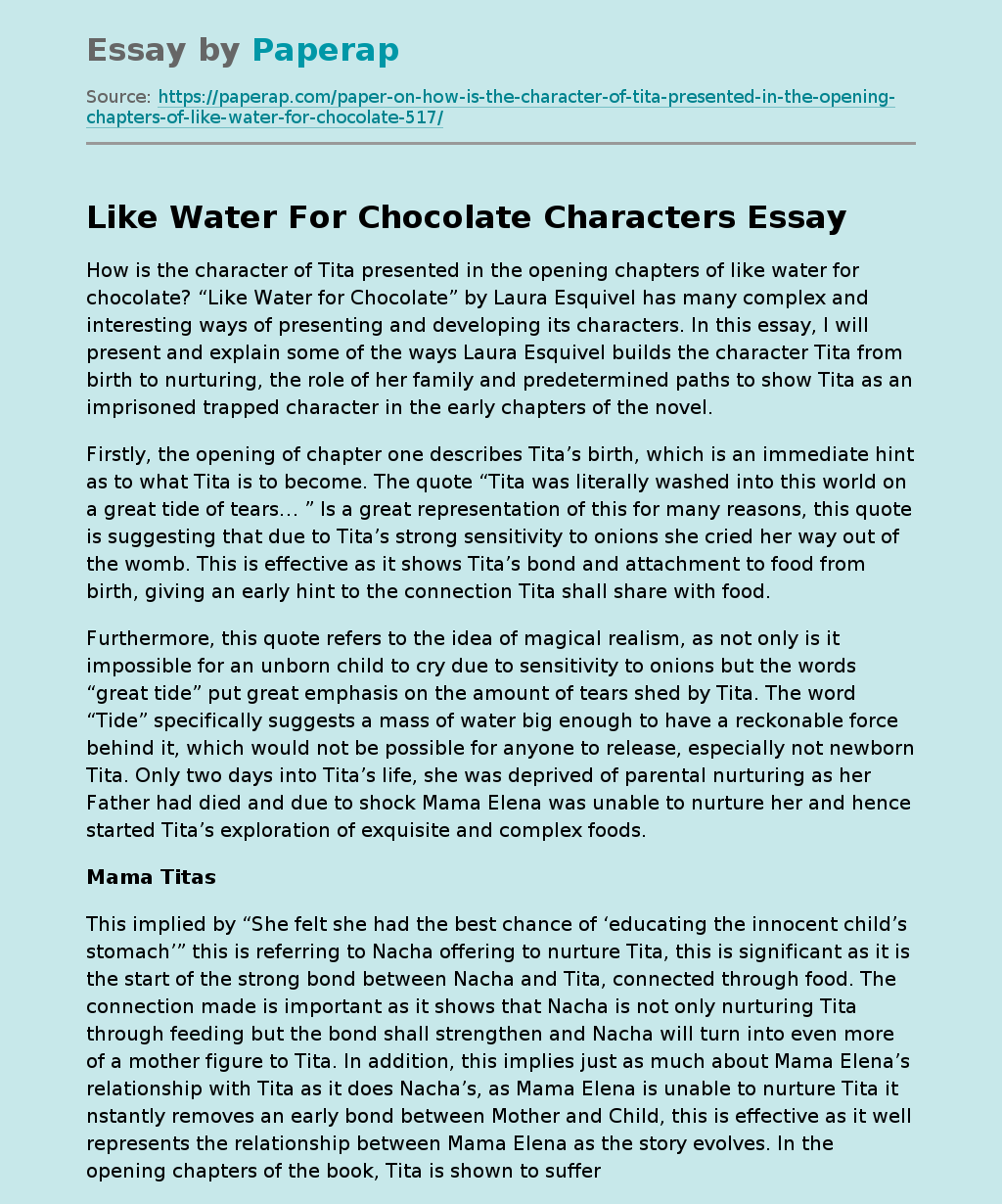Like Water For Chocolate Characters
How is the character of Tita presented in the opening chapters of like water for chocolate? “Like Water for Chocolate” by Laura Esquivel has many complex and interesting ways of presenting and developing its characters. In this essay, I will present and explain some of the ways Laura Esquivel builds the character Tita from birth to nurturing, the role of her family and predetermined paths to show Tita as an imprisoned trapped character in the early chapters of the novel.
Firstly, the opening of chapter one describes Tita’s birth, which is an immediate hint as to what Tita is to become.
The quote “Tita was literally washed into this world on a great tide of tears… ” Is a great representation of this for many reasons, this quote is suggesting that due to Tita’s strong sensitivity to onions she cried her way out of the womb. This is effective as it shows Tita’s bond and attachment to food from birth, giving an early hint to the connection Tita shall share with food.
Furthermore, this quote refers to the idea of magical realism, as not only is it impossible for an unborn child to cry due to sensitivity to onions but the words “great tide” put great emphasis on the amount of tears shed by Tita. The word “Tide” specifically suggests a mass of water big enough to have a reckonable force behind it, which would not be possible for anyone to release, especially not newborn Tita. Only two days into Tita’s life, she was deprived of parental nurturing as her Father had died and due to shock Mama Elena was unable to nurture her and hence started Tita’s exploration of exquisite and complex foods.
Mama Titas
This implied by “She felt she had the best chance of ‘educating the innocent child’s stomach’” this is referring to Nacha offering to nurture Tita, this is significant as it is the start of the strong bond between Nacha and Tita, connected through food. The connection made is important as it shows that Nacha is not only nurturing Tita through feeding but the bond shall strengthen and Nacha will turn into even more of a mother figure to Tita. In addition, this implies just as much about Mama Elena’s relationship with Tita as it does Nacha’s, as Mama Elena is unable to nurture Tita it nstantly removes an early bond between Mother and Child, this is effective as it well represents the relationship between Mama Elena as the story evolves. In the opening chapters of the book, Tita is shown to suffer greatly from the weight of her role in the family this is partially because of the family tradition “…being the youngest daughter means that you have to take care of me until the day I die. ” This is extremely effective as it shows the reader that Tita is disadvantaged to her sisters and bound by family tradition to be unhappy.
The importance of the introduction of this family tradition is that it gives Tita the opportunity to rebel against her mother’s rule. Pushed by her feelings for Pedro, Tita attempts to question the tradition and is silenced Mama Elena’s intimidating power. This is portrayed by “You don’t have an opinion, and that’s all I want to hear about it. ” this gives the reader a clear sense of Mama Elena’s control and power over Tita and implies an feeling of worthlessness in Tita and her opinion. Furthermore, the way in which Mama Elena says this is an example of the connection between Mama Elena and Tita.
Laura Esquivel specifically writes this quote in a way to portray a strong sense of command in Mama Elena’s tone, which is provided through a closed end commanding statement. In the early chapters Tita is portrayed as having an unavoidable fate of being suppressed and imprisoned, an example of this is “Tita lowered her head, and the realization of her fate struck her as forcibly as her tears struck the table. ” This is significant as it implies to the reader of what Tita has to look forward to throughout the book, sorrow and suppression caused mostly by Mama Elena.
The word ‘fate’ suggests a force in which Tita has no say or control over, suggesting that the path is predetermined. Which for the most part is what Tita’s life has been so far, especially for example the family tradition, stripping Tita the privilege of marriage and restricting her to a life of taking care of Mama Elena. In conclusion, in the opening chapters of Like Water for Chocolate Tita is described as an imprisoned helpless daughter at the mercy of her mother’s power. Through ideas of fate and her role as the youngest daughter in the family, she is stripped of marriage and many other privileges her sisters can enjoy.
Like Water For Chocolate Characters. (2019, Dec 05). Retrieved from https://paperap.com/paper-on-how-is-the-character-of-tita-presented-in-the-opening-chapters-of-like-water-for-chocolate-517/

